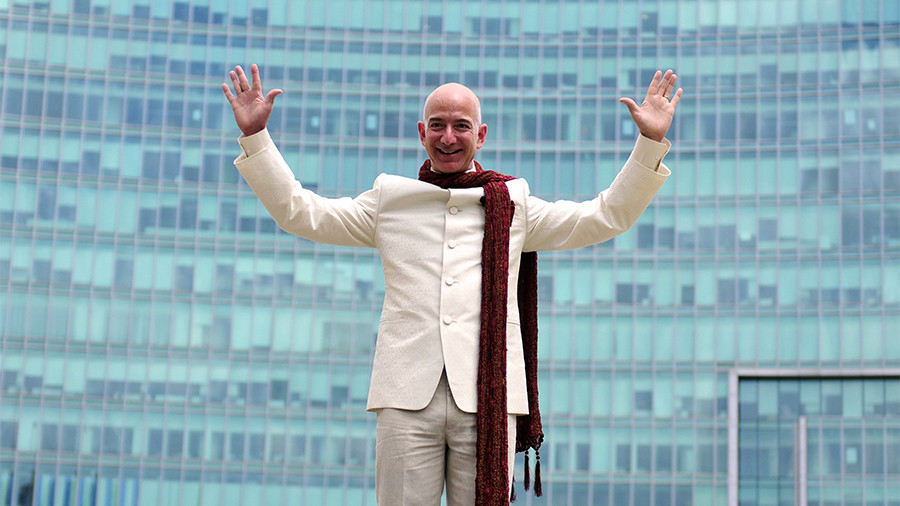World’s Top 5 ‘Most Evil’ Corporations
CAPITALISM, 1 Oct 2018

Jeff Bezos, founder and chief executive officer of Amazon, poses as he stands atop a supply truck during a photo opportunity at the premises of a shopping mall in the southern Indian city of Bangalore.
© Abhishek N. Chinnappa / Reuters
Most companies become successful thanks to their stellar reputations. But not always. The most hated companies trending on the internet.
Monsanto
The company that needs no introduction, creator of DDT and Agent Orange, Monsanto is one the world’s largest pesticide and GMO seed manufacturers. It is known for being the first company to genetically modify a seed to make it resistant to pesticides and herbicides. Monsanto’s herbicides have been blamed for killing millions of crop acres, while its chemicals were added to blacklists of products causing cancer and many other health problems.
https://twitter.com/RT_com/status/968884751258984448?ref_src=twsrc%5Etfw%7Ctwcamp%5Etweetembed%7Ctwterm%5E968884751258984448&ref_url=https%3A%2F%2Fwww.rt.com%2Fbusiness%2F420349-five-most-evil-companies%2F
Apple
Once the darling of Microsoft-hating gadget lovers, Apple more recently has been accused of mistreating or underpaying their employees, hiding money offshore, and not paying taxes. It has also been accused of violating health or environmental legislation, and misusing its position where they have a monopoly in the market. And, oh yes, deliberately slowing older iPhones and overcharging for its products to boot.
https://twitter.com/RT_com/status/944402182719320064?ref_src=twsrc%5Etfw%7Ctwcamp%5Etweetembed%7Ctwterm%5E944402182719320064&ref_url=https%3A%2F%2Fwww.rt.com%2Fbusiness%2F420349-five-most-evil-companies%2F
Nestle
The world’s largest food and beverage company Nestle says it is committed to enhancing quality of life and contributing to a healthier future. However, it has been dragged through numerous scandals involving slave labor. The multinational is one of the most boycotted corporations in the world, as violations of labor rights have been reported at its factories in different countries.
Nestlé admits possibility of slave labor in its coffee #supplychain https://t.co/2k9HaqKbav pic.twitter.com/cgDNmLQNOv
— Segura (@SeguraSystems) March 9, 2016
Philip Morris
The products of the American multinational cigarette and tobacco manufacturing company are sold in over 180 countries outside the United States. Philip Morris owns Marlboro, one of the world’s biggest brands. Back in 1999, Philip Morris courted officials of the Czech Republic by explaining how smoking would in fact help their economy, due to the reduced healthcare costs from its citizens dying early.
httpv://www.youtube.com/watch?v=Sbrqm0Jt7q4
McDonald’s
American fast-food company McDonald’s was founded in 1940. The company serves more customers each day than the entire population of Great Britain, but has a long history of terrible labor practices. It has been constantly under fire for serving unhealthy junk food, which contributes health problems. Researchers have found that McDonald’s burgers cannot decompose on their own.
https://twitter.com/RTUKnews/status/914023004513947648?ref_src=twsrc%5Etfw%7Ctwcamp%5Etweetembed%7Ctwterm%5E914023004513947648&ref_url=https%3A%2F%2Fwww.rt.com%2Fbusiness%2F420349-five-most-evil-companies%2F
Notable mentions of corporations not quite evil enough to make the top list:
Goldman Sachs
JPMorgan Chase
ExxonMobil
Halliburton
British American Tobacco
Dow Chemical
DuPont
Bayer
Microsoft
Amazon
Walmart
DISCLAIMER: The statements, views and opinions expressed in pieces republished here are solely those of the authors and do not necessarily represent those of TMS. In accordance with title 17 U.S.C. section 107, this material is distributed without profit to those who have expressed a prior interest in receiving the included information for research and educational purposes. TMS has no affiliation whatsoever with the originator of this article nor is TMS endorsed or sponsored by the originator. “GO TO ORIGINAL” links are provided as a convenience to our readers and allow for verification of authenticity. However, as originating pages are often updated by their originating host sites, the versions posted may not match the versions our readers view when clicking the “GO TO ORIGINAL” links. This site contains copyrighted material the use of which has not always been specifically authorized by the copyright owner. We are making such material available in our efforts to advance understanding of environmental, political, human rights, economic, democracy, scientific, and social justice issues, etc. We believe this constitutes a ‘fair use’ of any such copyrighted material as provided for in section 107 of the US Copyright Law. In accordance with Title 17 U.S.C. Section 107, the material on this site is distributed without profit to those who have expressed a prior interest in receiving the included information for research and educational purposes. For more information go to: http://www.law.cornell.edu/uscode/17/107.shtml. If you wish to use copyrighted material from this site for purposes of your own that go beyond ‘fair use’, you must obtain permission from the copyright owner.